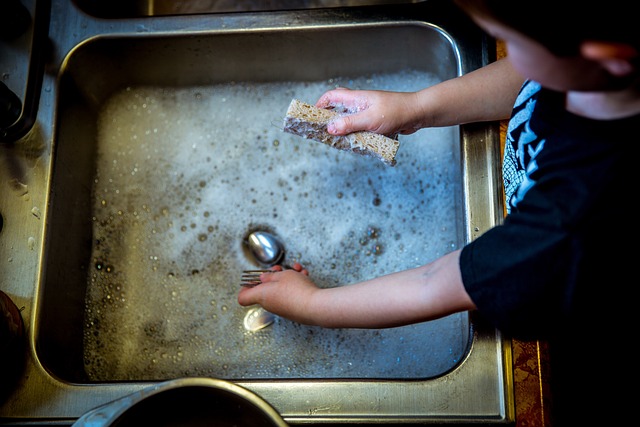
In a world increasingly conscious of environmental issues, adopting eco-friendly practices in our daily lives is crucial. The kitchen, being the heart of a home, offers a significant opportunity to make sustainable choices. In our homes, where we cook and eat, there’s a cool way to help our planet: eco-friendly dishwashing! This guide is like a map to show you how to make your kitchen super green.
Imagine your kitchen becoming a superhero for the Earth! We’re going to learn about special soaps that don’t hurt nature, ways to save water, cool dishes and utensils that don’t use plastic, and even how to use less energy. It’s like making your kitchen a happy place for you and the Earth at the same time. So, get ready to learn the secrets of being a superhero for our planet right from your kitchen sink!
Conscious Dishwashing Detergents
Plant-Based Formulas
Choose dishwashing detergents with plant-based ingredients. These formulas are biodegradable and gentle on the environment. Look for labels indicating ingredients like citrus extracts, aloe vera, and coconut oil.
Phosphate-Free Options
Phosphates in dishwashing detergents contribute to water pollution. Opt for phosphate-free alternatives to minimize your ecological footprint. Brands now offer effective phosphate-free options that maintain the cleanliness of your dishes without harming aquatic ecosystems.
Packaging Matters
Consider the packaging of your dishwashing detergent. Look for products in recyclable or biodegradable packaging to reduce plastic waste. Some companies even offer refill stations, promoting a circular economy.
DIY Dishwashing Solutions
For the truly eco-conscious, consider making your dishwashing solution. A mixture of baking soda and white vinegar can effectively clean dishes while being gentle on the planet. There are numerous online recipes for homemade dishwashing soap.
Efficient Usage
Use only the recommended amount of detergent. Overuse not only wastes product but also contributes to excess chemical runoff. Follow the guidelines on the product packaging for optimal results.
Water Conservation
Soak Before Washing
Allow dishes to soak in hot water before washing. This softens dried-on food, making it easier to clean without excessive scrubbing. This simple step reduces the need for running water during the washing process.
Invest in a High-Efficiency Dishwasher
If you use a dishwasher, consider upgrading to a high-efficiency model. Modern dishwashers use less water and energy, making them more environmentally friendly. Look for Energy Star-rated appliances for maximum efficiency.
Install a Low-Flow Faucet
Opt for a low-flow faucet in your kitchen. These faucets regulate water usage, providing sufficient water pressure while minimizing wastage. It’s a small change that can have a significant impact over time.
Reuse Rinse Water
Instead of letting the water run continuously while rinsing dishes, collect the rinse water in a basin or bowl. You can then reuse this water for watering plants, cleaning, or other household tasks, ensuring that not a drop goes to waste.
Time Your Dishwashing
Be mindful of the time spent washing dishes. Turning off the tap while scrubbing or soaping up can save gallons of water. A timer or gentle reminder can help cultivate this habit.
How to Choose Sustainable Dishware and Utensils
Choose Eco-Friendly Materials
Opt for dishware and utensils made from sustainable materials like bamboo, stainless steel, or recycled glass. These materials have a lower environmental impact compared to traditional plastic or disposable options.
Ditch Single-Use Plastics
Eliminate single-use plastics from your kitchen. Invest in reusable utensils, plates, and cups. Stainless steel or glass containers are excellent alternatives for storing leftovers without contributing to plastic pollution.
Mindful Dishware Purchases
When purchasing new dishware, consider its longevity and eco-friendliness. Investing in high-quality, durable items reduces the need for frequent replacements, minimizing waste in the long run.
Support Local Artisans
Explore handmade dishware crafted by local artisans. Supporting local businesses not only contributes to the community but also often results in unique, one-of-a-kind pieces that add character to your kitchen.
Secondhand and Vintage Options
Consider shopping for secondhand or vintage dishware. Thrift stores, online marketplaces, and garage sales offer a treasure trove of kitchen items with plenty of life left in them. This choice promotes recycling and reduces demand for new production.
Energy-Efficient Kitchen Practices
Air Dry Instead of Heat Dry
If you use a dishwasher, choose the air-dry setting instead of heat drying. This simple switch can significantly reduce energy consumption, saving both electricity and money on your utility bills.
Use Cold Water When Possible
Opt for cold water when washing dishes by hand. Using hot water requires energy to heat it, contributing to your overall environmental impact. Save hot water for tough grease or sanitation needs.
Consider Solar-Powered Appliances
Explore the possibility of solar-powered kitchen appliances. From dishwashers to water heaters, harnessing solar energy can dramatically decrease your kitchen’s carbon footprint.
Upgrade to LED Lighting
Make the switch to energy-efficient LED lighting in your kitchen. LEDs consume less energy, last longer, and are available in various styles, ensuring both functionality and aesthetics.
Unplug Appliances When Not in Use
Appliances that remain plugged in, even when turned off, consume “phantom” energy. Get into the habit of unplugging kitchen gadgets and appliances when they’re not in use to reduce unnecessary electricity usage.
Tips for Waste Reduction and Composting
Scraping Over Rinsing
Before placing dishes in the dishwasher, scrape off excess food instead of rinsing. This minimizes water usage and prevents food particles from entering the water supply, contributing to a healthier ecosystem.
Establish a Composting System
Set up a composting system in your kitchen for food scraps. Composting not only reduces landfill waste but also creates nutrient-rich soil for your garden. Many municipalities offer composting programs or facilities for easy disposal.
Reusable Dish Towels and Napkins
Choose reusable dish towels and napkins instead of disposable paper products. Washing and reusing fabric items generate less waste and are often more absorbent and durable than their disposable counterparts.
Upcycled Storage Solutions
Get creative with storage solutions by upcycling containers or jars. Reusing glass jars for storing leftovers or bulk goods reduces the need for plastic containers and promotes a circular economy.
Mindful Purchasing Habits
Be conscious of the packaging when buying kitchen products. Opt for items with minimal or eco-friendly packaging. Choosing in bulk when possible reduces the need for excessive packaging materials and decreases overall waste.
Conclusion
Taking up eco-friendly dishwashing techniques in the kitchen is a concrete approach to help create a more sustainable future. From thoughtful detergent selection to waste management tactics, every action helps reduce your environmental footprint. By implementing these easy-to-follow guidelines, you can transform your kitchen into an eco-friendly sanctuary, proving that modest adjustments can have a big impact on the environment and your family.







